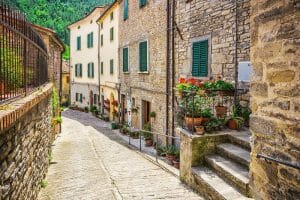Buying Property In Italy

By Christopher Nye
In Italy you generally do not need a lawyer because the agent and the notary are both working for you, the buyer as well as the seller, and are legally bound and professionally indemnified to conduct the sale fairly. With the notary knowing the law and the agent knowing the property intimately, all angles should be covered.
Every time the law changes, as it does frequently, estate agents have to go on more courses to maintain their professional standing.
The biggest online source to search for property is property-italy.immobiliare.it, which operates in eight languages. Gate-away.com is an Italian portal aimed at foreign buyers.
Italian estate agents (agenzie immobiliari) charge fees normally of 3% but possibly as high as 8%, plus 22% VAT. As mentioned, however, the agent, along with the notary, is responsible for the sale being managed fairly. You save, therefore, on legal fees.
The most crucial part of the buying process, therefore, is to only work with an authorised estate agent who is registered (as an estate agent) at the local Chamber of Commerce. They will have studied all the legal issues, the land registry, how to read maps and the cadastro, and have passed comprehensive exams before being enrolled and registered as an estate agent. Their website and documents will include an inscription along the lines of Iscrizione al Ruolo degli Agenti di Affari in Mediazione, usually with a registration number next to it and the name of the Chamber of Commerce. If you use an unregistered agent they will have no legal responsibility over the sale and no insurance if it all goes wrong.
Agents may also be part of a professional organisations, such as AICI, FIMAA and FIAIP.
There are three stages to the buying process.
When the house hunter has set their heart on a house, the estate agent will show them the documents of the house, including the deeds, land registry papers, details of any work that has been done and the permits allowing that.
If they wish to make the offer, the offer letter proposta d’acquisto is written by the agent and passed to the seller. If the deal is between two Italians the offer letter would normally include a cheque, made out to the seller for perhaps 10 or 20% of the sale price. The cheque is never cashed, however, it is simply a symbol that you are serious, especially if offering below the asking price. With overseas buyers there would be little point, so the tradition is usually not followed. The letter offer, however, is official, and includes such details as the land registry address and co-ordinates.
In Italy the notary (notaio) is chosen by the buyer but acts for both parties, organising searches and deeds at this early stage.
This proposta is signed by both parties if they agree and within ten days the process moves on to the second stage, the intention to buy. All agreements are in theory binding, except that with foreign buyers until there is money passing hands it would be difficult to enforce.
Every document has to be made out in both languages if the buyer is from overseas.
The sale is formalised in the preliminary contract, contratto preliminare di vendita, around ten days later. This includes details of the property, boundaries, rights of way etc, as well as the date of the handover. The buyer may well include stipulations of matters that need to be cleared up before completion, such as an outstanding planning permission being agreed.
On signing this the purchaser normally pays a deposit of at least 10% of the purchase price, known as the caparra confirmatoria which is paid into the seller’s account by banker’s draft. The buyer would now need a legally valid reason to back out or they would forfeit their deposit. If the vendor unreasonably backs out they could be forced to repay double. For this reason, however, the deposit should be big enough to deter the seller from accepting a higher offer which could be bigger than they would lose on the deposit.
The preliminare will also include a date of completion, normally within 30 to 60 days.
With country property the completion is more likely to be 60 days because of the neighbouring registered farmers’ right of first refusal to buy the property, known as a pre-emption right.
The third and final step is the deed of sale (atto di vendita), drafted by the notary, translated if either party do not speak Italian, and signed at their office. The balance is paid at the same time by banker’s draft, along with taxes and fees. At this point ownership is transferred and buyer receives keys to the property. The agency fees are stated on the deeds. Italy’s strong anti-money laundering laws mean that every legal and financial process is strictly checked.
Buying costs also include tax of 2% of the rateable value on a primary home and 9% if a holiday home. Professional fees are subject to 22% VAT.
